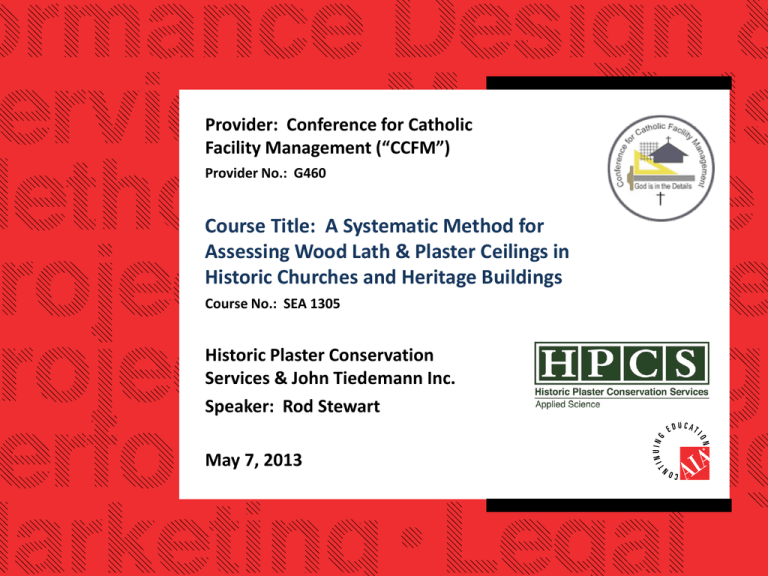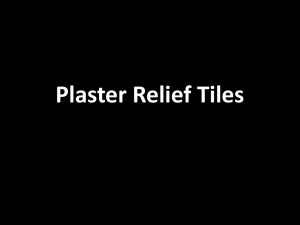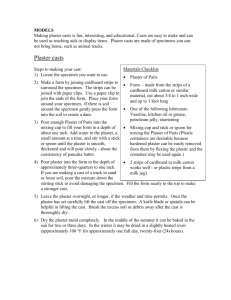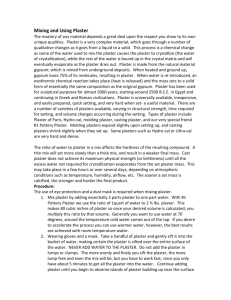A Systematic Method for Assessing Wood Lath & Plaster Ceilings in
advertisement

Provider: Conference for Catholic Facility Management (“CCFM”) Provider No.: G460 Course Title: A Systematic Method for Assessing Wood Lath & Plaster Ceilings in Historic Churches and Heritage Buildings Course No.: SEA 1305 Historic Plaster Conservation Services & John Tiedemann Inc. Speaker: Rod Stewart May 7, 2013 Credit(s) earned on completion of this course will be reported to AIA CES for AIA members. Certificates of Completion for both AIA members and non-AIA members are available upon request. This course is registered with AIA CES for continuing professional education. As such, it does not include content that may be deemed or construed to be an approval or endorsement by the AIA of any material of construction or any method or manner of handling, using, distributing, or dealing in any material or product. _______________________________________ Questions related to specific materials, methods, and services will be addressed at the conclusion of this presentation. Copyright Materials This presentation is protected by US and International Copyright laws. Reproduction, distribution, display and use of the presentation without written permission of the speaker is prohibited. Historic Plaster Conservation Services Limited & John Tiedemann Inc. Conference for Catholic Facility Management 2013 Course Description Participants will learn how to safely access and work in attics above historic wood lath and plaster ceilings, and how to methodically assess and quantify the condition of a plaster ceiling as a system. Learning Objectives At the end of this course, participants will be able to: 1. 2. 3. 4. Understand how to manage the risks involved with working in an attic environment above a wood lath and plaster ceiling, and various occupational health and safety considerations to take into account, using examples and photographs. Understand how to select, mark out and prepare specific test locations within a large plaster ceiling, using examples and photographs. Understand the skill of pull-testing plaster keys and lugs, and how to systematically record the test results, using examples. Understand how to tabulate and extrapolate the test results to quantify the overall condition of a plaster ceiling, which will lead to a decision on the need for preventive maintenance treatment, using sample results. 5 In plain language: • Learn to work safely within attic space in order to assess the plaster condition - select sample test locations - learn how to pull-test plaster - learn how to record the test results • Learn how to interpret the results 6 The Cultural Importance of Historic Plaster 7 A systematic assessment: the application of a system of analysis to obtain data which can be empirically evaluated. 8 The Current Art of Assessment • • • • • • Ancient technique of sounding In scientific world – “Impact Echo Testing” Use of sound waves Uniform density = uniform wave patterns Variable density = variable wave patterns Used extensively on aircraft fuselages 9 Sounding in Architecture • Much less effective in architecture • Good for cast plaster ornaments • Very limited value with plain face plaster 10 The Challenges of Assessment • • • • Church buildings are huge Full surface assessment is prohibitive Conflicts of interest Facility managers need good, reliable data How do we do this? 11 Another Method of Assessing Plaster is Available • Easily learned • Repeatable and verifiable • Simple premise: the wood lath and plaster in your building is part of a system • System deterioration process starts from inception 12 What Holds Up a Wood Lath and Plaster Ceiling? • A suspended system • Mechanical keys and lugs • Plaster is not adhered to the wood – that is it’s strength • If it was “pasted” on – it would have soon cracked and collapsed 13 How Wood Lath and Plaster Ceilings Were Made • Wood lath - the base • Lath was green and soaking wet • Typically, 3/8th inch gap between each strip of lath • Wet plaster applied in several coats, forming a hard, brittle covering • Wet plaster “slumps” to form keys and lugs • Wood lath shrinks – leaves plaster shell suspended…with flexibility 14 Two Types of Wood Lath Sawn Lath Split Lath 15 What Can We Learn From Close Examination… • Lugs and keys hold the ceiling up • They support the ceiling collectively • Need to understand how individual keys and lugs fail in order to understand the deterioration process 16 The keys are pushed up through the lath spaces The lugs are nicely folded over, “locking “ the suspended ceiling in place 17 How the System Breaks Down 18 Five Things That Go Wrong 1. Water infiltration and erosion 2. Trauma from unsafe working procedures – highly preventable. 3. Big structural issues in the framing of the ceiling come to a head 4. Ongoing stress from building micro-movements 5. Moisture vapor transmission mobilizes salts 19 How plaster deteriorates on its own: • Small continuous movements of building • Transmission of moisture vapor 20 When Plaster Ceilings Collapse • From looking at the surface, no sign of trouble • Never any warning – collapse is sudden and unanticipated • Apprehended collapse - burden of loadbearing weight shifts to fewer and fewer keys • Failure is decades in the making 21 The Benefits and Advantages of the Proposed Assessment Method • Assesses structural integrity of plaster system • Tells us where plaster system is in its “service life” • Helps us understand immediate, short and longer term implications • Contributes important information to maintenance planning • Vital for budget planning 22 The Importance of the Other Side of the Ceiling - the Attic • Only from the attic can you see the mechanical connection on which the ceiling depends • Hence, a proper assessment must be conducted in attic 23 Overview of a Typical Church Attic Space 24 The Challenges of Working in an Attic Above a Plaster Ceiling • Darkness, dirt and dust • Bat and/or bird guano sometimes present – potential risk of histoplasmosis • Steep cavernous arches • Poor ventilation • Repository for garbage • Enormous square footage, especially in churches 25 Steep cavernous arches difficult to navigate 26 The Method Objective: to safely assess and quantify the condition of the plaster ceiling as a system For today’s discussion: • Large mid-19th century gothic, heavy timberframed church with approximately 10,000 square foot ceiling area • High nave and sanctuary with side aisles and clearstory windows 27 Step 1: Establish that the attic is a fit place to go Preliminary Measures 1. 2. 3. 4. 5. 6. 7. 8. 9. 10. Determine the conditions of the attic Is there lighting? Are ladders and guardrails in safe order? Are there any bio-hazards present? Are there electrical hazards? Is there debris? Is the ceiling insulated? Is there flooring covering the ceiling access? Is the attic a “confined” space? Do we need specialized professional assistance? 28 Other Issues and Basic Safety Precautions • Liability insurance for contractors and additional professional assistance – case by case considerations • Personal Protective Equipment (PPE) and Fall Arrest training required - same as any construction site • Once the attic is deemed safe to operate in, assessment can begin. 29 Step 2: Select Sample Test Areas • In our case study, approx. 10,000 square feet of ceiling surface • Sample test area - roughly 3’ by 3’ • Objective: to assess between 1% and 2% of the square footage • Sample areas must be representational 30 Step 3: Mark Out Test Location • Mark out test areas using red/green/blue painters tape • Take photographs • Number each location – L1, L2, etc. – on Test Data Card • Staple or tack card within test location. 31 Test Data Card 32 Sample Test Location 33 Step 4: Clean Sample Test Areas • Gently scrub with bristle brush • Vacuum clean (Wear safety mask and goggles - this is dirty work) 34 Sample Test location (after cleaning) 35 Step 5 – Measure All Keys Within Test Area • Measure all keys (intact, missing and broken) within test area • Record the total number of linear inches on the Test Data Card 36 Step 6: Pull-test Keys and Lugs 37 Pull-testing Keys and Lugs Testing plaster keys is an acquired skill and a vitally important one: • Hold a well-formed key between thumb and index finger and exert slight upward rotational pressure • One of three things will occur: 1. The key will move under slight pressure with no snapping 2. The key will stand firm against the pressure applied 3. The key will stand firm for a time and as pressure is increased, will snap off. • After pull-testing, measure all missing and broken keys within the test area and record total number of linear inches on the Test Data Card Note: every key and lug within the sample area must be tested 38 Step 7: Collect Broken Keys 39 Step 8 – Re-clean Test Area 40 Step 9: Measure functioning keys, apply formula and complete Test Data Card 41 42 Step 10: Tabulate Test Results 43 Calculate the Results • Average the test results (% “As-Built” Strength) from all test areas 44 What Do The Results Mean? • • Snap shot of conditions as of today The larger the sample size the more reliable the results 45 Some Cautions 1. Throwing out the high and low test results 2. The nature of arches 46 When To Act • Many ceilings exhibit losses of 10-15% strength but are not at risk of failure • Substantial loss can exist without risk • Preventive maintenance planning should begin below 75% • Test results below 60% probably represent a safety problem 47 This concludes The American Institute of Architects Continuing Education Systems Course. At this time, the course participants are free to ask questions. Rod Stewart , Historic Plaster Conservation Services (HPCS) & John Tiedemann Inc. (JTI) Contact: Andy Guljas 1-765-269-4625 HPCS: 1-888-6242854 info@historicplaster.com JTI: 1-877-600-2666 info@johntiedemannin.com


![First Aid Training : Bronze [Power Point]](http://s2.studylib.net/store/data/005424634_1-e0b0e5e602f7c1666ebc2e9ff3f4a1b5-300x300.png)








